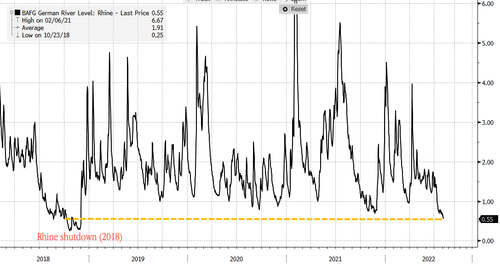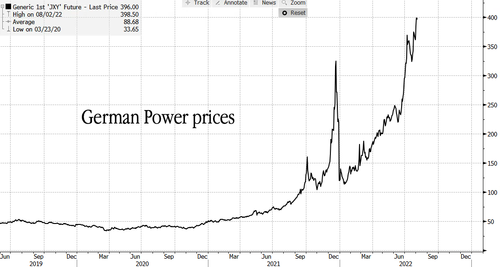SOURCE:
Germany's Uniper SE, the country's largest utility (recently bailed out by state-owned lender KfW), warned Thursday that plunging water levels on the Rhine River have reduced barge shipments of coal to a key power plant, exacerbating an energy crunch as power prices soar to record highs, reported Bloomberg.
The river at Kaub, Germany, is around 21.6 inches (55 centimeters) on Thursday and is expected to drop to 18.5 inches (47 centimeters) by Saturday, according to the German Federal Waterways and Shipping Administration. Currently, Europe's most crucial waterway is 5.9 inches (15 centimeters) from being impassible, the threshold where barge traffic is 15.7 inches (40 centimeters).
Uniper said the low water levels could force "irregular operation" at its 510-megawatt Staudinger-5 coal-fired power plant through the first half of September because fewer and fewer barges have been able to deliver coal as stockpiles dwindle. Rhine water levels below 40 centimeters at Kaub would halt shipments via inland waterways to the power plant, forcing shipments by land.
On Wednesday, Riverlake, a vessel broker, said, "fewer and fewer barges can pass through Kaub."
Uniper's warning about low water levels impacting operations at a coal-fired power plant is more evidence Rhine troubles are exacerbating Germany's worst energy-supply crunch in decades as Russia reduces natural gas flows via Nord Stream 1 to just 20% capacity.
Meanwhile, German power for next year soared to a record intraday high of 410.57 euros per megawatt-hour on the European Energy Exchange on Thursday on the prospects of a worsening energy crisis.
Besides Uniper, here's what other German companies are saying about low water levels on the Rhine and how they seek alternatives for transporting goods (list courtesy of Bloomberg):
BASF, chemicals
- Company is using rail more for goods
- Uses Rhine to transport 4.5 million tons of raw materials and products annually to and from its main site at Ludwigshafen
- Already operates a vessel that can carry up to 200 tons when the so-called Pegel water measure -- which is used to calculate draft -- is as low as 30 centimeters
- Two other barges that can operate at very low water levels are on order
- Has already expanded cooling plants which compensate for the lower volume of water that can be taken from the Rhine in dry periods
EnBW, utility
- The cost of shipping coal is increasing and that is pushing up its operating costs
- Company has built up coal inventories
- Its plants on the Rhine and also the river Neckar both have rail connections
RheinEnergie, utility
- Has always used rail for its Cologne-Merkenich lignite plant
VTG, railcar operator
- War in Ukraine has pushed up demand for coal transportation, as industries work to cut natural gas consumption
- Already operating at full capacity, partly due to staff shortages
Hoyer, truck operator
- Operating at full capacity
- Notes lack of truck drivers
Evonik, chemicals
- Company has already chartered additional ships and trucks
- Currently there are no significant constraints to its supply chains
- Company says it is better prepared than in 2018
Lanxess, chemicals
- Low water levels aren't currently affecting logistics
- If Rhine water level drops further, company can switch to rail and road transportation

